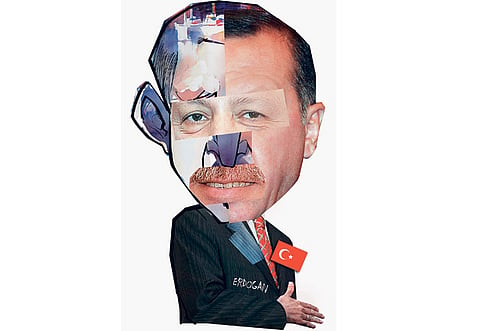Turkey's rising regional influence
Obama believes that Ankara could play a vital role in resolving critical issues in the Middle East

Over the past year, Turkish-Israeli relations have turned increasingly sour, moving from one stumbling problem into another. Last week, a diplomatic crisis with potentially serious implications blew up between the two countries. Israeli Deputy Foreign Minister Danny Ayalon summoned Turkish Ambassador to Israel Ahmet Oguz Celikkol to a meeting to protest a Turkish soap opera that depicted Israeli agents kidnapping Palestinian children.
When the ambassador arrived, he received a lower seat than Ayalon — and was photographed in that position, making it appear that Ayalon was speaking to an inferior. Ayalon wouldn't shake hands with him during the televised parts of the meeting, and had an Israeli flag visible on the table. Topping it all off, Ayalon told an Israeli cameraman in Hebrew that the important thing was that people see Celikkol sitting down low "while we're up high."
Turks saw the images as a deliberate pre-planned Israeli insult. They demanded an apology and threatened to withdraw their ambassador if their demand was not met within hours. Israel conceded, but relations between the two countries seem to have been badly damaged.
The ambassador story was the latest episode in a series of crises that have hit relations between what was once described as the closest pro-western allies in the region. Since the Israeli assault on Gaza in December 2008, Turkey has been taking a more critical approach towards Tel Aviv. Israel, on the other hand, has been open in expressing anger at Turkish foreign policy under the ruling Justice and Development Party (AKP). Deep bitterness has been particularly pronounced at the Turkish decision to exclude Israel from its international military exercise ‘Anatolian Eagle' in October 2009. Turkish Prime Minister Recep Tayyip Erdogan justified that decision on the grounds that "Ankara could not allow fighter jets that had also been used in missions against Palestinians in the Gaza Strip to fly over Turkish airspace".
Earlier that year, Erdogan vented his anger on Israeli President Shimon Peres during the World Economic Forum in Davos, Switzerland, because of the Gaza war. The war on Gaza was not the only bone of contention between the two former allies. Turkey and Israel have been also at pain to conceal their differences over regional issues, ranging from Iran nuclear programme to relations with Syria and Iran.
Indifferent attitude
Oddly enough, the US has not so far shown any interest to intervene to contain the crisis between its two key regional allies. Given Washington's instrumental role in promoting the Turkish-Israeli military alliance, the indifferent attitude of the Obama administration has been perplexing for most analysts and commentators. In 1996, the Clinton administration encouraged the two sides to develop their relations into a full-fledged military alliance. Ever since, Turkey has become a major client for the Israeli military industries. The two countries have also conducted joint military exercises on an annual basis. In addition, Washington has, for decades, made developing ties with Israel a key condition on Turkey to acquire some of the most advanced US weaponry.
That seems to have changed. Over the past year, president Obama has been overly ignoring calls from pro-Israel lobbies and Congressmen to ‘punish' Turkey for its ‘unfriendly' attitude towards Israel. On the contrary, Obama has been trying to strengthen ties with Turkey independently from the latter's relationship with Israel. Despite Turkey's spat with Israel over the Gaza war, he chose Istanbul as the first Islamic city to visit after his election and from there he made his first major speech to the Islamic world.
Clearly, Turkey's rising regional influence has tipped the top of Obama's agenda. He believes that Ankara could play a vital role in Iraq, Afghanistan, Palestine, Iran's nuclear programme, the Middle East peace process and in establishing better relations with the Islamic world. Turkey is being therefore encouraged to play a greater role in most of these problems.
Most political analysts would agree that Turkey has become today Washington's most useful and most reliable regional ally. Unlike Israel, as a moderate Islamic state, Turkey's role is welcomed in many places around the region as a power broker, moderator and sometimes a leader. Economically, Turkey has been emerging as a big power not only at a regional level but globally as well. It has been ranked as one of the tenth biggest world economies with a GDP well above $900 billion in 2009, according to the World Bank. Given the world financial crisis, Turkey's economic role is being acknowledged, making it a permanent member of the G20.
Indeed, Israel and its friends in Washington do not seem to be impressed. They believe that Israel might become the biggest loser of Turkey's new regional role. They might be absolutely right. Given Netanyahu's obstructive attitude and his opposition to Obama's peace plan, Turkey might be replacing Israel as the US most important strategic asset in the Middle East.
Dr Marwan Al Kabalan is a lecturer in media and international relations at Damascus University's Faculty of Political Science and Media in Syria.


